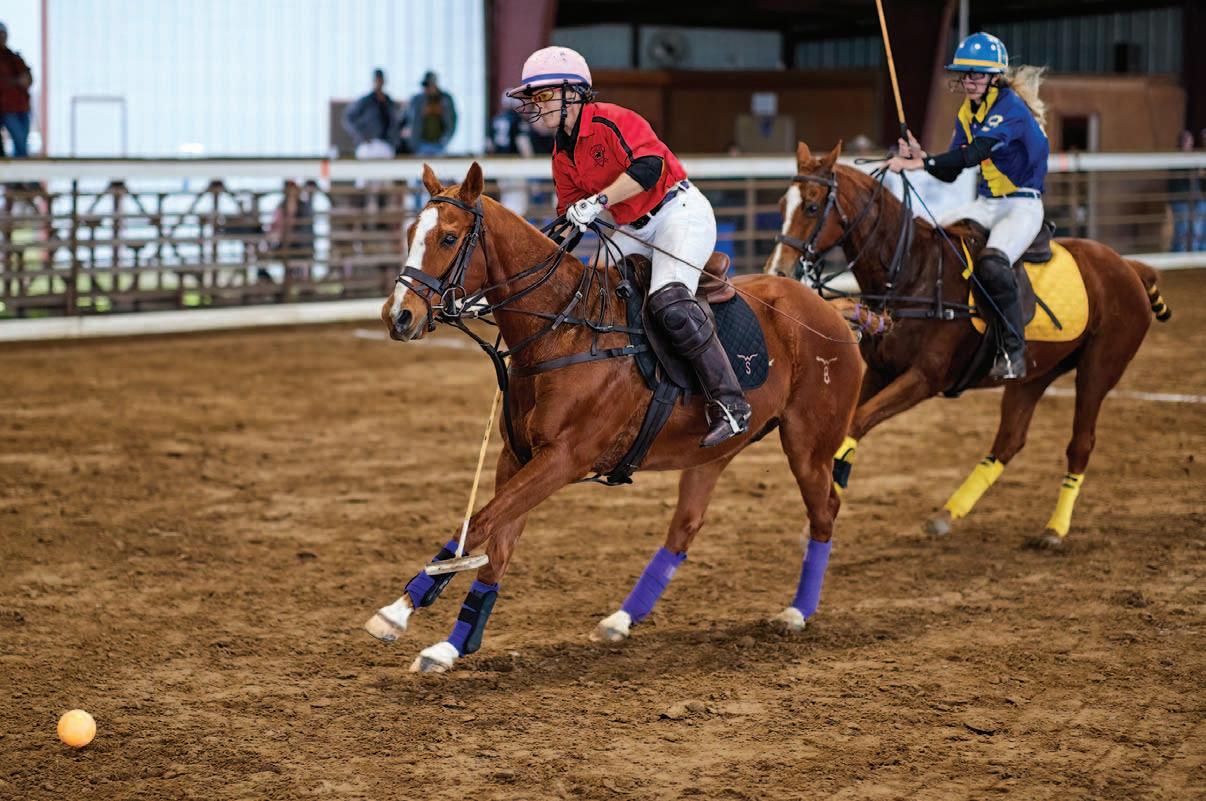
16 minute read
Association News
The National Arena Amateur Cup rankings are listed on uspolo.org. Below: Stephanie Massey comes in to challenge Wendy Stover.
Fall Polo at New Bridge
New Bridge Polo & Country Club, located in Aiken, South Carolina, will host a 12-Goal Trifecta this fall. Three national USPA tournaments will be held from September through November at the 12- goal level. All interested teams are encouraged to sign up for this one-of-a-kind opportunity. All tournaments are USPA sanctioned. For more information, please email polo manager, Haley Bryan at hbryan2485@aol.com or general manager, Raza Kazmi at razanewbridge@gmail.com.
12 Goal
Northrup Knox Cup: Sept. 10-27
National Copper Cup: Sept. 30-Oct. 18 (Closing Date: Sept. 15)
Bronze Trophy: Oct. 21-Nov. 1 (Closing Date: Oct. 5) 8 Goal
National President’s Cup: Sept. 16-Oct. 3 (Closing Date: Sept. 1)
Association Cup: Oct. 7-25 (Closing Date: Sept. 21)
Southeastern Circuit Masters Cup: Oct. 28-Nov. 1 (Closing Date: Oct. 14)
Video Rulebook
The United States Polo Association has launched a new “Ask A Question” section to the bottom of each Umpire Video Rules Library page on uspolo.org. This allows both USPA members and fans to submit questions and comments and get responses directly from USPA umpires. These questions will be visible to all site visitors.
Navigate to the umpires’ page on uspolo.org to browse through the Umpire Video Rulebook organized by outdoor and arena rules. Scroll to the
bottom of any rule’s page and click “Ask Question.” Umpires will be notified of questions asked and will respond shortly, providing a more efficient way of communication.
National Arena Amateur Cup Rankings
An initiative launched in 2019 by the Tournament and Arena Committees, the new format of the National Arena Amateur Cup has continued to be a success. This format has created an opportunity to showcase the accessibility of amateur polo and to incentivize amateur players to participate longer and more frequently in USPA tournaments at their home clubs, in their home circuits and nationally.
All amateur players rated -1 through 3 goals will be eligible. In accordance with National Arena Amateur Cup rules, no player may have a handicap higher than the upper limit of the event. If there is a question regarding whether a player falls into the amateur category, that decision will be made by the NAAC Tournament Committee, in consultation with the player’s home club manager as well as the club’s circuit governor.
Eligibility to play in the National Arena Amateur Cup will be based on a point system. Those who have competed in the Pacific Coast Arena League, Texas Arena League, horse shows, or other sports—like NASCAR, cycling or triathlons—should be familiar with the concept of a points system based on win-loss or ranking.
Points will be given to individuals playing in all USPA arena events—circuit, sanctioned and national. Points will be based on the number of teams and team standing in each tournament. All points will be awarded to each team member, not the team as a whole. Points will be based on team members playing the entire tournament and all chukkers within each game. Players with the highest points will be eligible to play in the National Arena Amateur Cup.
In addition to NAAC points, circuit and national arena events are eligible for: • Trophies and/or trophy reimbursement from
USPA • Arena Incentive Program reimbursement funds • Pump 8 Umpire (maximum 8-goal tournament with four team minimum) • Exposure through USPA weekly e-blast “This
Week In Polo” and Polo Players’ Edition magazine with submission of write-ups and photos
To view 2020 rankings, visit the National Arena Amateur Cup page on uspolo.org. For more information, contact tournament coordinator, Kaila Dowd at kdowd@uspolo.org.
Tournament Results
Clubs are encouraged to assemble and submit summer tournament results from all USPA events for inclusion in the Blue Book and on uspolo.org. Tournament results may be submitted electronically through the tournament database. Please include the name of the host club, name of tournament and dates played.
Information must also include names of players on all teams that have competed in the event, list of games played with scores of each game and a captioned high-resolution photo of the winning team for each event, as well as Most Valuable Player and Best Playing Pony. If you have any questions about the tournament database, please contact tournament coordinator, Kaila Dowd at (561) 517-1652 or via email at Kdowd@uspolo.org.
USPA Club Awards
The USPA offers awards for excellence in four fields to be presented annually at each USPA member club. All club delegates are encouraged to submit their choices for each award and clubs will be sent certificates to present to awardees. Recipients will also be recognized in the USPA Blue Book. Please see descriptions below for each award. Club Delegates will receive instructions via email to submit. • Owen O’Hanlon Best Groom Award: Awarded to the best groom, based on dedication, ability and knowledge. • Dr. Billy Linfoot Most Improved Player Award:
Awarded to the most improved player for the year based on the following virtues: improved athletic ability, sportsmanship and integrity in all aspects of the game both on and off the field. • Clint Nangle Equine Welfare Award: Awarded to an individual who has demonstrated excellence in the field of equine welfare. • Club Pony of the Year: Awarded to an exceptional pony at your club (playing, lessons, etc.)
Gen. George S. Patton Jr. Award
Remembered for his fierce determination and ability to lead soldiers, Gen. George S. Patton Jr. is considered to be one of the greatest military figures in history. Immortalized as one of the world’s most intriguing military men, he was known for carrying pistols with ivory handles, his intemperate manner and his love for polo.
Patton was an avid believer that polo was a useful tool in understanding how his fellow officers performed under pressure. Regarded as one of the most successful United States field commanders of any war, he continuously drove his troops to the highest standard of excellence in training, and utilized his love for polo as a teaching aid. He traveled from post to post with a fine set of polo ponies and routinely established polo matches at his assigned military bases. Patton encouraged participation, and helped grow awareness and interest in the sport.
The Armed Forces Committee encourages nominations of members who have gone above the call of duty to create opportunities for military members and their families to be involved in the sport of polo. Include how the nominee best embodies the characteristics described with your nomination. Nominees are not required to have served in the military but must be current USPA members.
Please submit your Gen. George S. Patton Jr. Award nominations to Kaila Dowd at kdowd@uspolo.org by December 31.
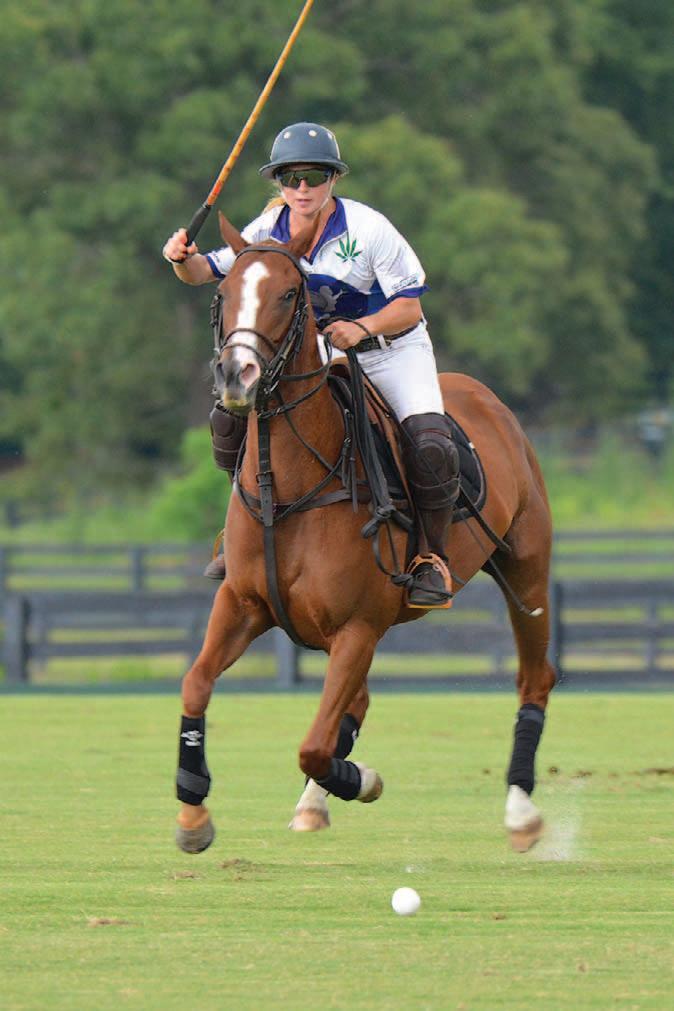
Submit tournament results for inclusion in the Blue Book and on uspolo.org. Above: Jewel Gregoncza competes at New Bridge.
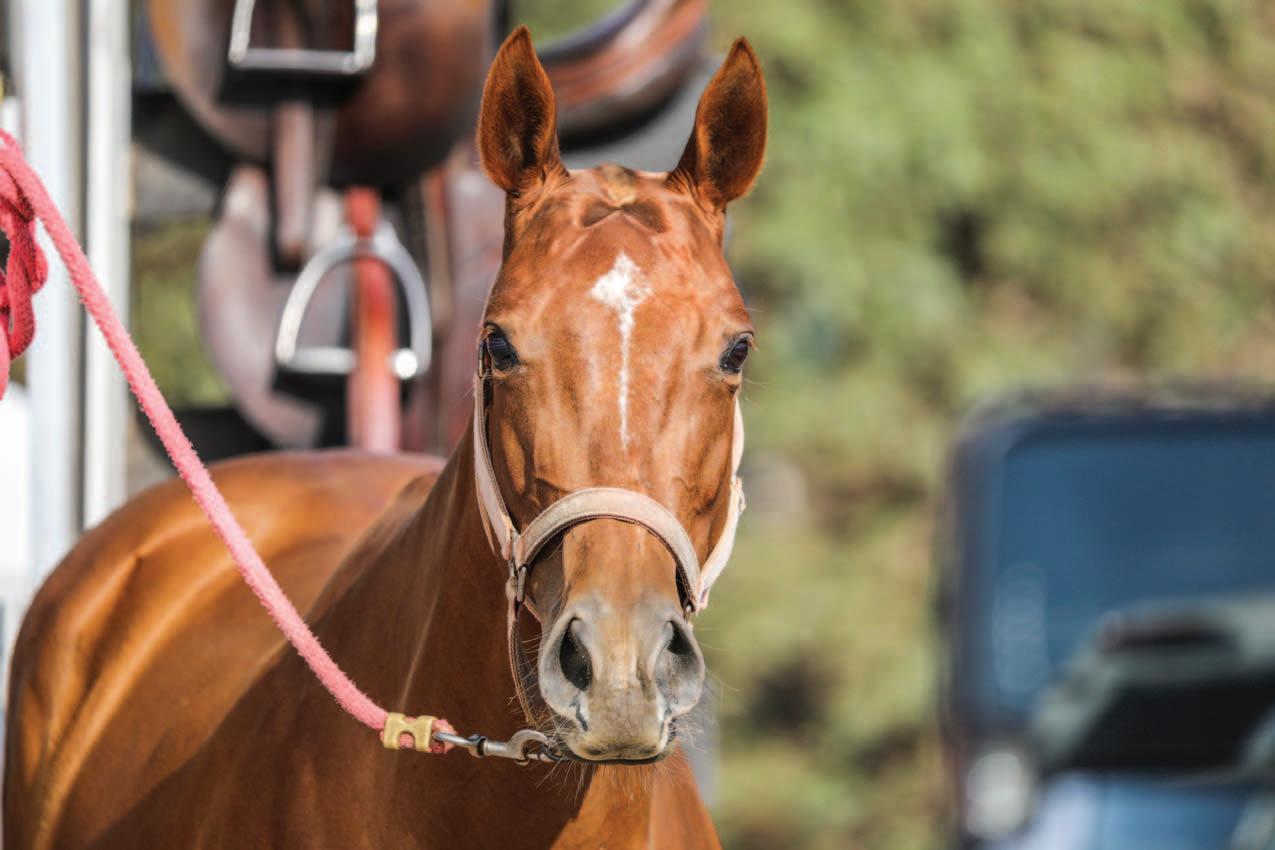
Club delegates are encouraged to submit their choices for club awards, including Club Pony of the Year.
Published by the United States Polo Association Offices at 9011 Lake Worth Rd., Lake Worth, Florida 33467 • (800) 232-USPA Chairman: Stewart Armstrong President: Tony Coppola Secretary: Charles Smith Treasurer: Steven Rudolph Chief Executive Officer: Robert Puetz

South Bay Polo Club, near San Francisco, recently hosted a NYTS tournament.
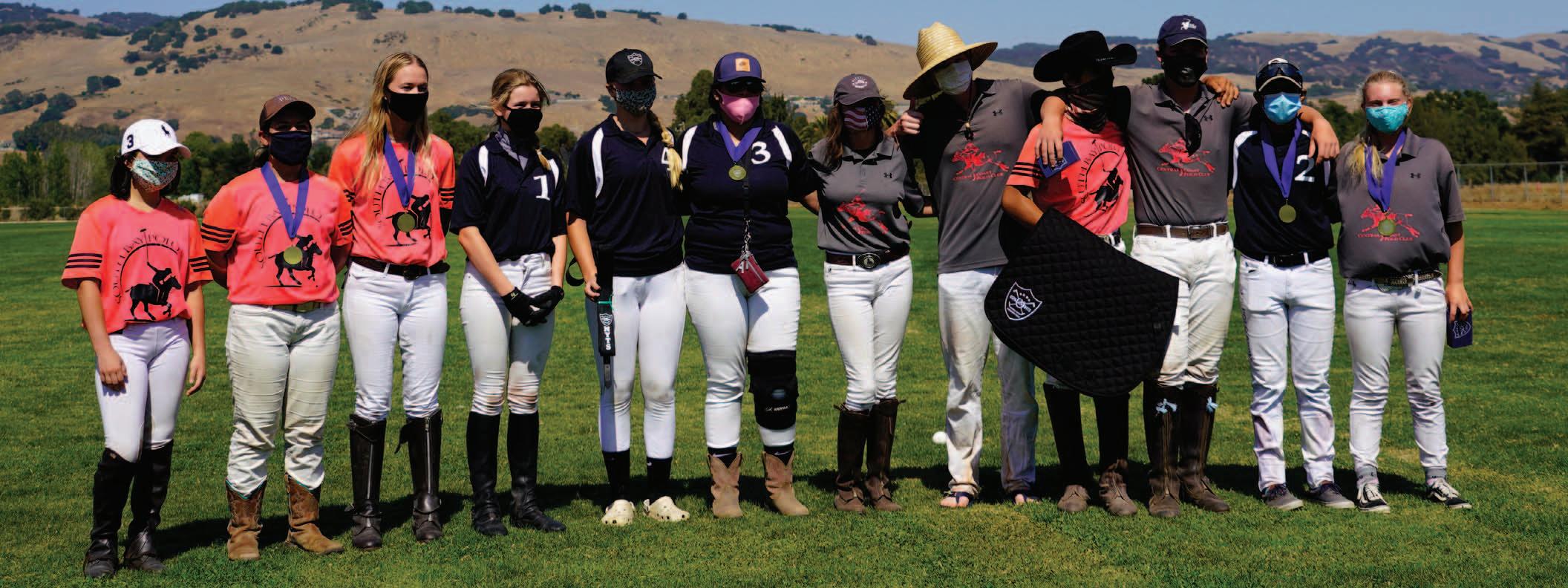
Intercollegiate/Interscholastic
I/I season kicks off Sept. 1. I/I Teams make sure to keep an eye out for start of the season information! You will be receiving emails on requirements and dates in the coming weeks. All information will also be posted on the I/I page at uspolo.org. If you are interested in starting an interscholastic or intercollegiate team, please contact Ali Davidge at adavidge@uspolo.org to get started.
I/I National Alumni tournament
The Feldman Cup, the I/I program’s National Alumni Tournament will be held Sept. 18-20 at the Central Coast Polo Club in Los Osos, California. To qualify, individuals must have participated as a player on either an intercollegiate or interscholastic team. To find out more information, head over to the I/I page on uspolo.org or contact Amy Fraser at afraser@uspolo.org.
Intercollegiate Funding Program
Attention intercollegiate teams! Make sure to be on the lookout for the opening of the Funding Enhancement application. Teams are able to apply for up to $2,000 worth of reimbursement on tack and other game items. For a more in-depth list of items and the application please visit the I/I page on uspolo.org.
Middle School
Do you have a group of youth players in grades 5- 8? If so, sign up now to host a middle school tournament at your club between September and November. Contact Emily Dewey at edewey@uspolo.org.
Players and parents, if you or your child are interested in participating in a Middle School League tournament, keep an eye out for the tournament schedule at uspolo.org!
NYTS
The 2020 National Youth Tournament Series continues to provide junior players with the opportunity to compete against their peers. Several NYTS Qualifiers were played in all corners of the U.S., from Boston to Wyoming to the San Francisco area and Canada.
Big Horn All-Stars: Miki Astrada, Lance Stefanakis, Vance Miller, Cruz Bilbao
Boston Polo Club All-Stars: Taylor Palacios, Vlad Tarashansky, Matteo Chaux, Landen Daniels, Caleb Kingsbury, Brynn Whitten, Rehan Kumble
South Bay All-Stars: Taylor Olcott, Ajay Moturi, Elise Pardue, Lili Gonzales, Alyssa Garcia
Buffalo Polo Club All-Stars: Hunter Van der Burgt, Broma Maybe, Kat Gaulin, Julia Northcott
The Waiting Game Breeding for polo at Isinya HDC
by Jewel Connelly/United States Polo Association
BETH SKOLNIK
Which method of selecting horses has the best chance of producing a steady stream of high-quality polo ponies or even one horse whose legacy will leave a mark on the sport forever? It’s a question polo players, organizations and breeders have been trying to answer through trial and error since the inception of the game. There are many opinions surrounding the topic and with so many avenues to choose from, including breeding specific bloodlines, importing horses, repurposing off-the-track Thoroughbreds and even cloning, the exhaustive undertaking can be both time consuming and costly before ever yielding the desired results.
Seeking to prolong the gene pool of his retiring champion mares in the hopes of breeding more with their qualities, former American 10-goaler and Hall of Famer Owen Rinehart and his wife Georgie established Isinya HDC (Horse Development Corporation) in 1992, a Thoroughbred polo breeding and training facility in Aiken, South Carolina. Named by Rinehart’s wife, a Kenyan native, “isinya” is a Maasai word meaning “a place of sand,” which refers to Aiken’s natural terrain. A vision made into reality through the initial team effort of Georgie and Beth Skolnik, who believe in the merits of breeding specifically for polo, a process, which, although requires a period of waiting, consistently results in
The broodmare paddock at Isinya HDC in Aiken, South Carolina.
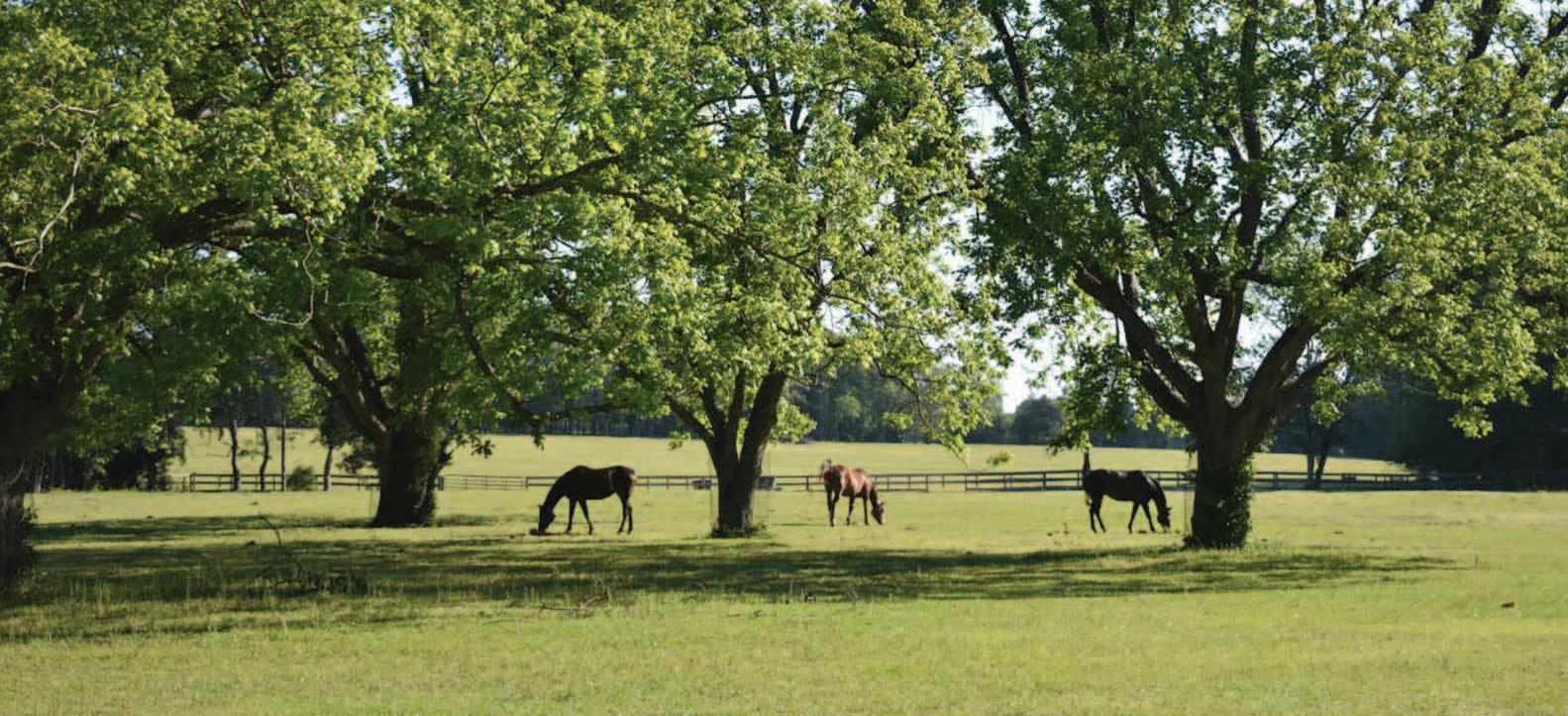
young horses predisposed with a mind for the game.
Dedicating the past 28 years to managing the breeding side of Isinya, Skolnik has played an integral role along with the founders since day one, assuming the reins of the operation as the business evolved. Raised in Los Angeles, California, Skolnik got her start exercising polo ponies and helping to work games at Will Rogers Polo Club. Especially interested in green horses, Skolnik dabbled in training and found herself on the other side of the world, working for Ellerston’s Kerry Packer in Australia.
“They were also doing breeding, which I was really interested in,” Skolnik said. “I started working for
Jingle Bell (Dolfina Jordie x Merry Christmas).
PAMELA FLANAGAN
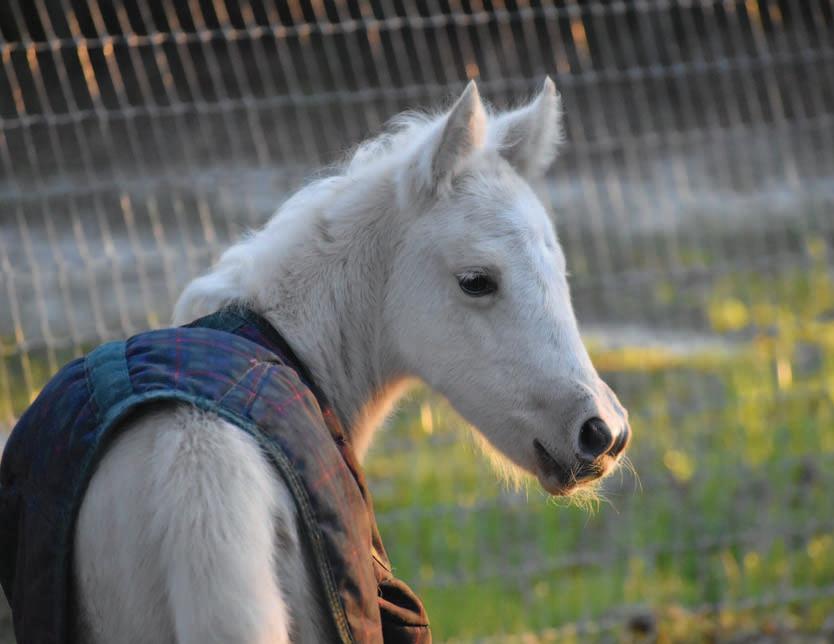
Sapo Caset and Dolfina Popular race downfield in the 2018 Ylvisaker Cup at International Polo Club Palm Beach.
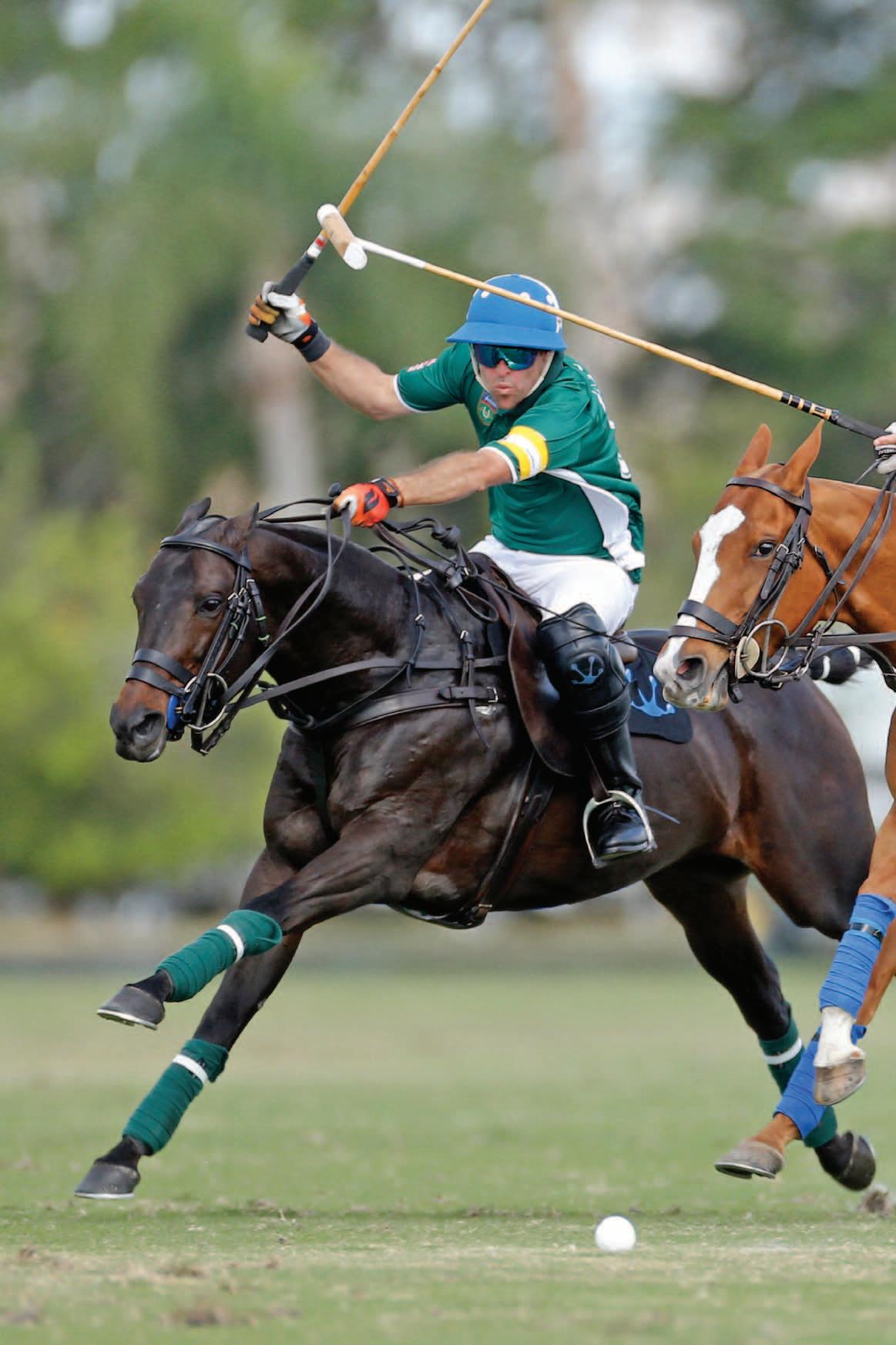
Owen after I left Australia, and Georgie was excited to breed so that’s when I really started to get into it.”
Frequented by many well-known polo playing families, such as the Busches and Orthweins, highgoal teams like Valiente and players, including 10- goaler Sapo Caset, Matt Coppola and Rob Jornayvaz, Isinya has earned quite a reputation among the highest level in the sport.
Awarded ‘Best Breeder of the Year’ by the American Polo Horse Association in 2009, Isinya’s motto speaks for itself: breed to the best and expect the best.
“Our percentage of horses that make it is very high because they are all bred for polo from proven stallions and mares, which generally gives them the right conformation,” Rinehart said.
“I truly believe in breeding 100% for your sport,” Skolnik added. “The horses who have generations of polo behind them understand the concept. You can get lucky with an OTTB, but we have so much more success breeding for polo. These horses play polo, it’s just at what level.”
Distinguishing themselves by their ability to follow the progression of the game, high-goal polo ponies reveal their potential through autonomous decision making.
“If I play with Owen regularly, some of the horses will start watching him and they’ll move down the field in response to what he’s doing, so they are grasping the idea and not just doing what you ask them,” Skolnik revealed. “The difference between a high-goal and a low-goal horse is when they are no longer just following the ball, but turning on their own and thinking to play the game.”
Breeding for a range of players, representing every skill level, Isinya is flexible to the needs of their individual clients, with options, including shipped semen, embryo transfer and breeding and foaling on site.
“Some clients leave their mares for up to 60 days to determine the sex of the developing foal and others leave them to foal out,” Skolnik said. “You can even leave your mare for the day and we’ll breed her so you can have her home that afternoon.”
A frequently used option is shipped semen. Skolnik organizes with each client’s veterinarian to see when the mares are ready to breed. A schedule is then created for each stallion during the spring and fall seasons. For mares currently playing, many owners opt for embryo transfer, a method which does not interrupt their career in addition to freezing embryos for mares to be bred at a later time.
Chosen by a variety of high-goal players, both American and Argentine, Isinya is an operation known for the quality of its horses and the knowledge of its staff.
“We chose Isinya because we really liked Riverdance, but also Owen [Rinehart] has been in the industry for a very long time,” Matt Coppola said. “He has a really good group of people who work for him especially Beth [Skolnik] and Cam [Davis] who have played a huge role in our success in breeding. I have two mares about to give birth there that we are very excited about and my stallion Sundance will be there soon as well.”
Aside from raising horses, which go on to perform well for their owners in high goal, Skolnik is equally pleased to present low-goal owners with a foal from their favorite mare. Encouraging owners to breed responsibly, Skolnik advises that only a player’s best playing or favorite mares be bred to pass on those traits to the next generation.
“If you breed the best bloodlines, you can produce
a horse that is even better than your best horse and that’s the goal,” Skolnik said.
Seeing some owners often make the mistake of waiting too long to consider their breeding options, Skolnik’s advice is to explore doing an embryo transfer at an earlier age. Planning ahead for the future well before a mare has reached retirement age is a proactive decision owners can make for the greatest success in having a foal.
While Isinya HDC offers an impressive selection of standing stallions such as Festival (Ventura x Cuartetera), Lord Easy and Sapo Caset’s Dolfina Popular (Durazno x Cuartetera), Skolnik emphasizes the importance of choosing a stallion for certain qualities.
“It’s always important to ask people who have bred to the stallion you are interested in and get their opinions first,” Skolnik advised.
Although stallions come and go from the farm over the course of the years, the ability to store frozen semen has allowed Isinya to continue to breed champions such as J5 Equestrian’s 2013 Willis L. Hartman trophy winner Open Medallón (Open Sunset x Ellerstina Medalla) and Dolfina El Boeing (Dolfina Millonario x Dolfina Lapa)—named “Best Argentine Polo Product” at the 2011 Jockey Club Open—even after their return to Argentina.
Offering a blend of Argentine and American bloodlines, current studs also include Rob Jornayvaz’s palomino stallion Dolfina Jordie (Durazno x Josie), Riverdance (River x Local Dancer) and Festival’s sire Ventura (Durazno x Buena Ventura) among others.
“I love the Riverdance line because they play polo,” Skolnik said. “His offspring are very balanced, fluid and they have great minds. They are also comfortable to ride, which he passes on to his babies. I’ve bred to him a couple times and they are athletic and so willing.”
After 11 long months anticipating their arrival, handling foals and watching the combinations and traits come to life in promising young polo ponies is the highlight of Skolnik’s day. A fixture in their lives since birth, Skolnik finds early exposure to humans to be tremendously helpful in their later training.
“The foals have human contact right away, so I find that makes it a lot easier to tame them,” Skolnik said. Often testing their boundaries in humorous ways on a daily basis and learning from their mistakes, the foals are very comfortable around humans and even affectionate.
“I like to tame them at 2 or even a year and a half because at 3 they are more set in their ways,”

Skolnik said. “The younger they are the more open they are to learning and accepting what I am asking them to do.”
Currently caring for two frisky foals, a palomino filly named Jingle Bell (Dolfina Jordie x Merry Christmas) and Machitos Joshua (Durazno x Machitos Jazzita), Skolnik is preparing for several more as the busy foaling season approaches.
Resisting the urge to push a talented prospect too fast, the old adage, “good things come to those who wait,” certainly rings true on the journey to unlocking a polo pony’s full potential. Competing in the United States’ most prestigious tournaments, horses representing almost every high-goal team playing in Florida have benefitted from Isinya’s ideologies on breeding or training. All their years of effort culminating on the field, the entire team is invested in the success of their young horses, watching several compete this season that were trained at the farm.
“Here everyone is involved in the process at different stages so when a horse does really well it reflects on all of us,” Skolnik shared. “It’s incredibly rewarding but it takes a long time to get them to that level where they are mentally ready for a sponsor or a pro to go to the hammer on them. Many people don’t want to wait five years to play a horse [that] is still maturing but it’s worth it in the end.”
Developing quality polo ponies is truly a craft, but one Isinya approaches with a considerable amount of patience and expertise. Setting a standard recognized by the best in the business, Isinya’s consistency demonstrates why exercising patience often produces the best results. •
Riverdance (River x Local Dancer)










